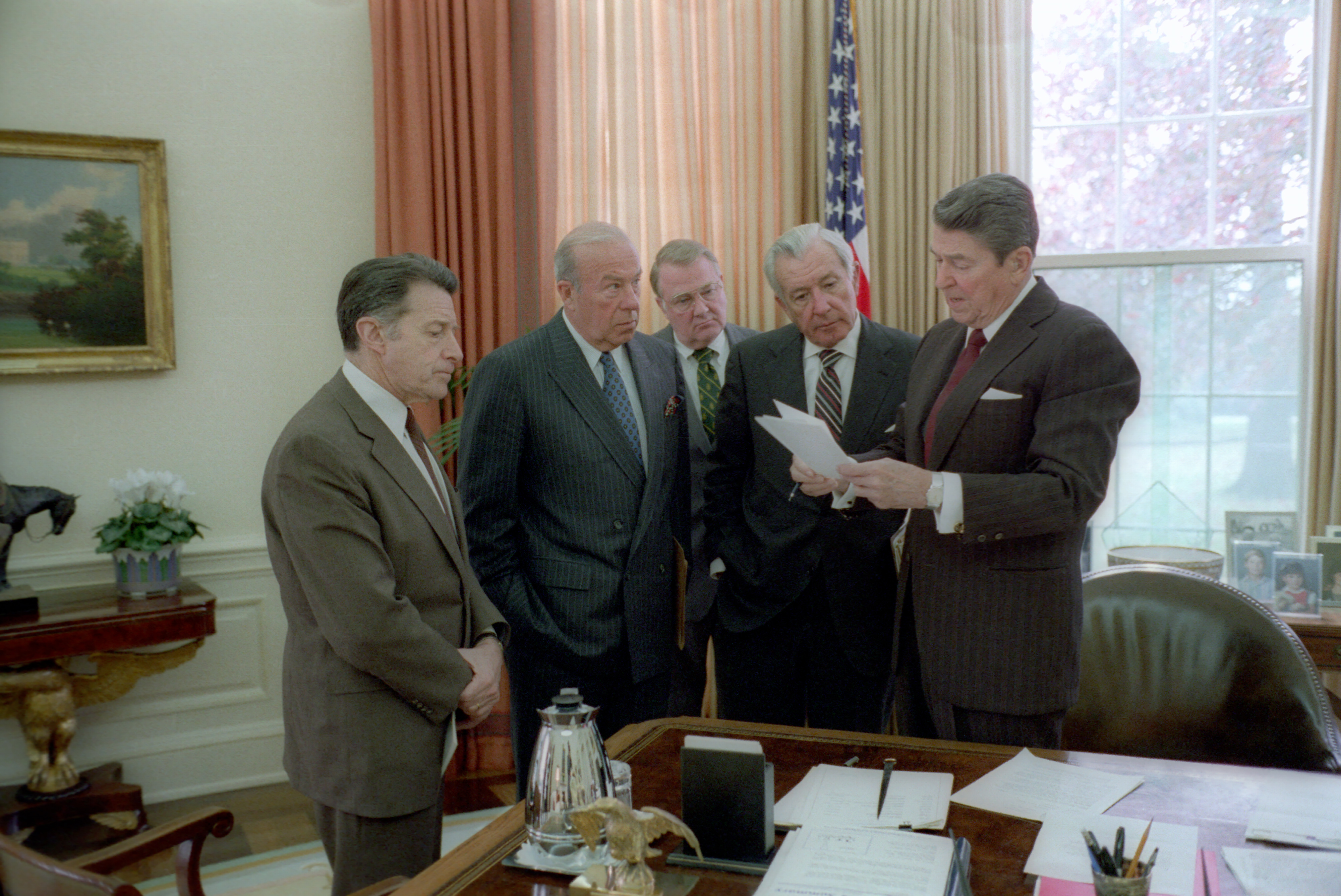
Iran–Contra affair
The Iran–Contra affair (Persian: ماجرای ایران-کنترا; Spanish: Caso Irán-Contra), often referred to as the Iran–Contra scandal, was a political scandal in the United States that occurred during the second term of the Reagan administration. Between 1981 and 1986, senior administration officials secretly facilitated the illegal sale of arms to Iran, which was subject to an arms embargo at the time.[1] The administration hoped to use the proceeds of the arms sale to fund the Contras, an anti-Sandinista rebel group in Nicaragua. Under the Boland Amendment, further funding of the Contras by legislative appropriations was prohibited by Congress, but the Reagan administration figured out a loophole by secretively using non-appropriated funds instead.
Date
20 August 1985 – 4 March 1987
Iran–Contra scandal, Iran–Contra
The official justification for the arms shipments was that they were part of an operation to free seven US hostages being held in Lebanon by Hezbollah, an Islamist paramilitary group with Iranian ties connected to the Islamic Revolutionary Guard Corps.[2] The idea to exchange arms for hostages was proposed by Manucher Ghorbanifar, an expatriate Iranian arms dealer.[3][4][5] Some within the Reagan administration hoped the sales would influence Iran to get Hezbollah to release the hostages.
In late 1985, Lieutenant Colonel Oliver North of the National Security Council (NSC) diverted a portion of the proceeds from the Iranian weapon sales to fund the Contras, a group of anti-Sandinista National Liberation Front (FSLN) rebels, in their insurgency against the socialist government of Nicaragua. North later claimed that Ghorbanifar had given him the idea for diverting profits from BGM-71 TOW and MIM-23 Hawk missile sales to Iran to the Nicaraguan Contras.[6] While President Ronald Reagan was a vocal supporter of the Contra cause,[7] the evidence is disputed as to whether he personally authorized the diversion of funds to the Contras.[2] Handwritten notes taken by Defense Secretary Caspar Weinberger on 7 December 1985 indicate that Reagan was aware of potential hostage transfers with Iran, by Israel, as well as the sale of Hawk and TOW missiles to "moderate elements" within that country.[8] Weinberger wrote that Reagan said "he could answer charges of illegality but he couldn't answer charge [sic] that 'big strong President Reagan passed up a chance to free hostages.'"[8] After the weapon sales were revealed in November 1986, Reagan appeared on national television and stated that the weapons transfers had indeed occurred, but that the US did not trade arms for hostages.[9] The investigation was impeded when large volumes of documents relating to the affair were destroyed or withheld from investigators by Reagan administration officials.[10] On 4 March 1987, Reagan made a further nationally televised address, saying he was taking full responsibility for the affair and stating that "what began as a strategic opening to Iran deteriorated, in its implementation, into trading arms for hostages."[11]
The affair was investigated by Congress and by the three-person, Reagan-appointed Tower Commission. Neither investigation found evidence that President Reagan himself knew of the extent of the multiple programs.[2] Additionally, US Deputy Attorney General Lawrence Walsh was appointed independent counsel in December 1986 to investigate possible criminal actions by officials involved in the scheme. In the end, several dozen administration officials were indicted, including then–Secretary of Defense Caspar Weinberger. Eleven convictions resulted, some of which were vacated on appeal.[12]
The rest of those indicted or convicted were all pardoned in the final days of the presidency of George H. W. Bush, who had been vice president at the time of the affair.[13] Former Independent Counsel Walsh noted that, in issuing the pardons, Bush appeared to have been preempting being implicated himself by evidence that came to light during the Weinberger trial and noted that there was a pattern of "deception and obstruction" by Bush, Weinberger, and other senior Reagan administration officials.[14] Walsh submitted his final report on 4 August 1993[15] and later wrote an account of his experiences as counsel, Firewall: The Iran-Contra Conspiracy and Cover-Up.[14]
Reports and documents[edit]
The 100th Congress formed a Joint Committee of the United States Congress (Congressional committees investigating the Iran–Contra affair) and held hearings in mid-1987. Transcripts were published as: Iran-Contra Investigation: Joint Hearings Before the Senate Select Committee on Secret Military Assistance to Iran and the Nicaraguan Opposition and the House Select Committee to Investigate Covert Arms Transactions with Iran (U.S. GPO 1987–88). A closed Executive Session heard classified testimony from North and Poindexter; this transcript was published in a redacted format. The joint committee's final report was Report of the Congressional Committees Investigating the Iran-Contra Affair With Supplemental, Minority, and Additional Views (U.S. GPO 17 November 1987). The records of the committee are at the National Archives, but many are still non-public.[132]
Testimony was also heard before the House Foreign Affairs Committee, House Permanent Select Committee on Intelligence, and Senate Select Committee on Intelligence and can be found in the Congressional Record for those bodies. The Senate Intelligence Committee produced two reports: Preliminary Inquiry into the Sale of Arms to Iran and Possible Diversion of Funds to the Nicaraguan Resistance (2 February 1987) and Were Relevant Documents Withheld from the Congressional Committees Investigating the Iran-Contra Affair? (June 1989).[133]
The Tower Commission Report was published as the Report of the President's Special Review Board (U.S. GPO 26 February 1987). It was also published as The Tower Commission Report by Bantam Books (ISBN 0-553-26968-2).
The Office of Independent Counsel/Walsh investigation produced four interim reports to Congress. Its final report was published as the Final Report of the Independent Counsel for Iran/Contra Matters. Walsh's records are available at the National Archives.[134]